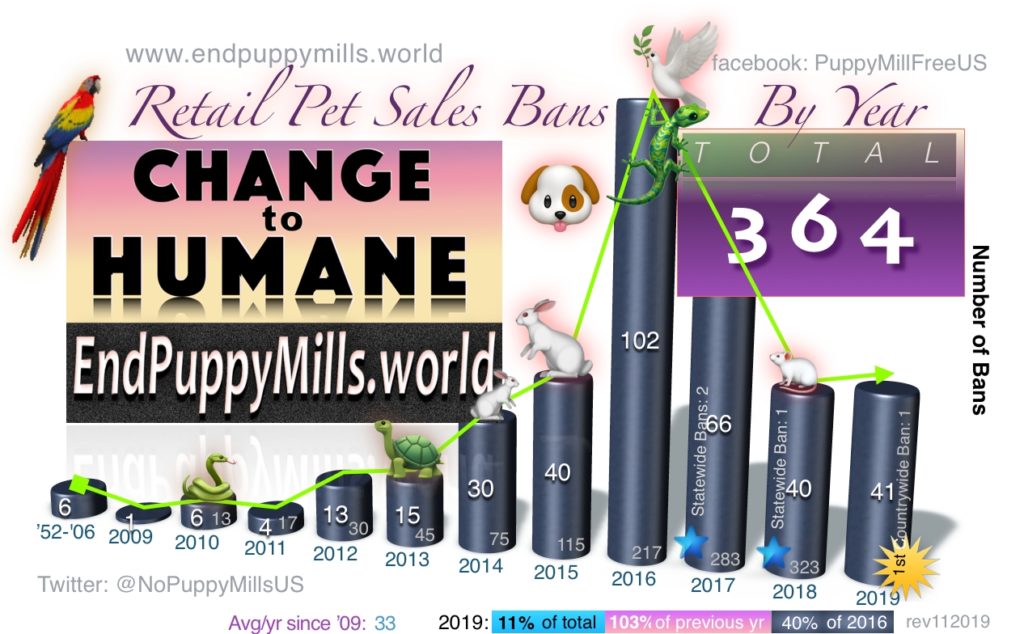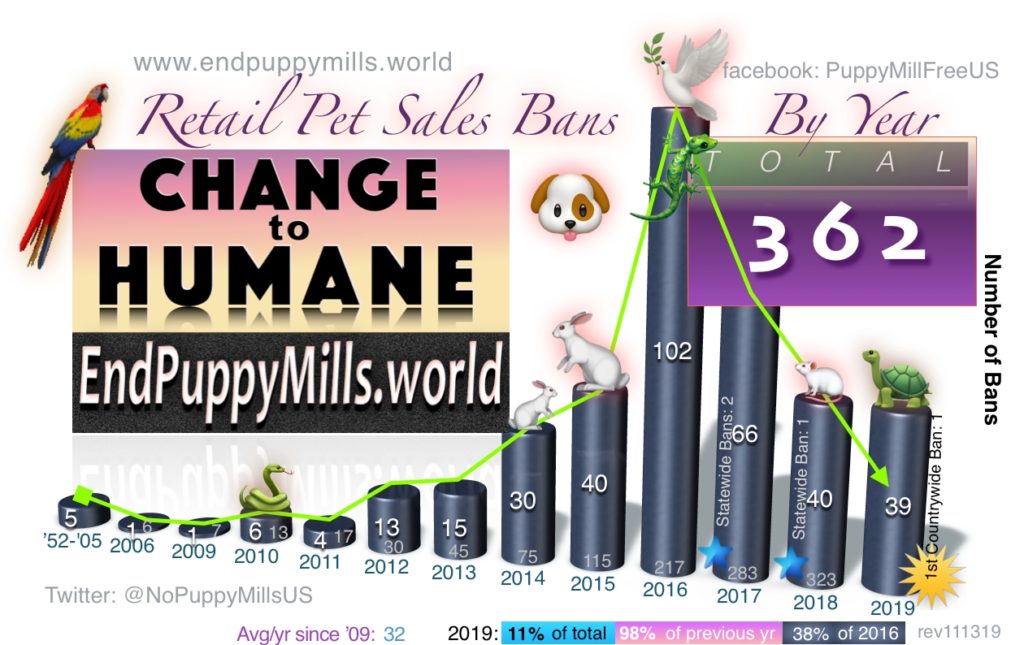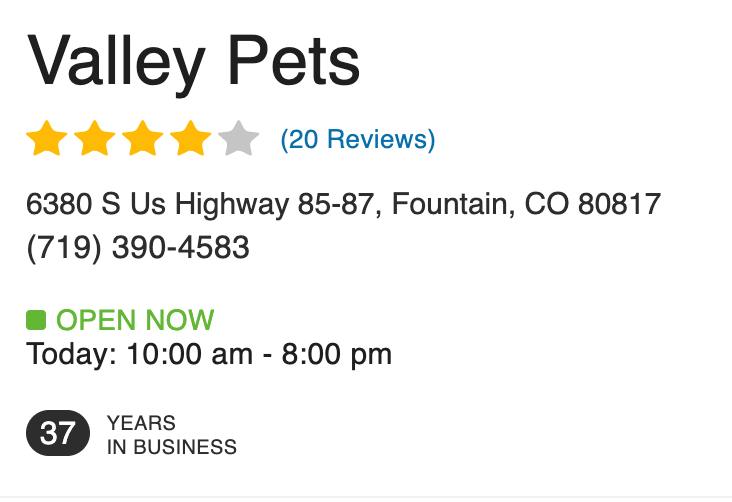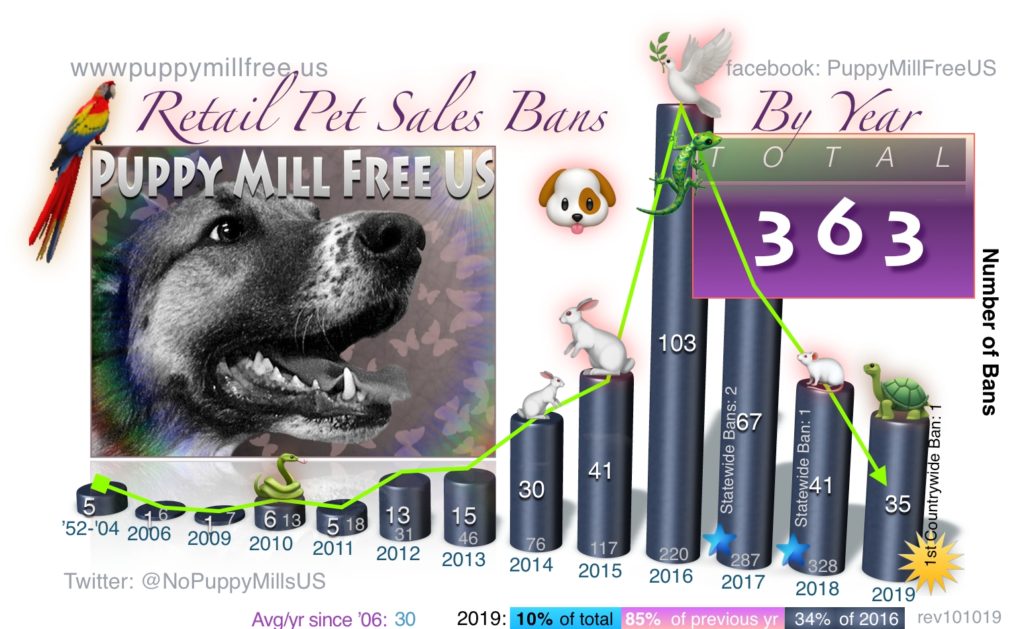December 10, 2019 — Metuchen, New Jersey, passes the world’s 365th ban.

End the Suffering
December 10, 2019 — Metuchen, New Jersey, passes the world’s 365th ban.

We track average bans per year since the first activist ban targeting a puppy store was passed by the hard work of Dawn Armstrong, then Executive Director of South Lake Tahoe Humane Society, which no longer exists. 1
Dawn and the whole community were disgusted by the puppy store there, Brock’s Pups, run by the Franks family, grandfather and grandson, who also owned Lil’ Pups in Carson City and Pets R Us in Meadowood Mall, Reno.
The day Dawn got the ordinance passed, the language of which is still largely in use to this day, the Franks were lead out of Brocks’ Pups in handcuffs for 1). Drug trafficking to minors for which ol’ man Franks was sent up the river for 6 years; and, 2). Parole violations.
Since that fateful day that started a movement, 364 bans have been passed in total, 41 have been passed in 2019, which just bested the previous year, and our average bans per year popped from 32 to 33.

We do have to note, however, we’re only at 40% of the bans passed in the single year 2016 and at just over 10% of the total bans passed. And so far, with the clock ticking to the end of the year, no statewide bans have yet been passed in 2019.
Good news, though: one COUNTRYWIDE ban passed this year, in England, with 2 more on the way in Wales and Scotland. Northern Ireland may join soon, though no action has yet been taken.
1 Dawn Armstrong told us in 2013 when we interviewed her at the start of Puppy Mill Free Reno and our tracking sites Puppy Mill Free US and End Puppy Mills World, that she was able to retire in peace and tranquility now that her work was being duplicated not only all over her home state of California, but was finding passage throughout the US and into Canada.
When Ms. Armstrong left in 2013, Niki Congero was hired as Executive Director. We spoke with her on several occasions regarding animal welfare issues at the lake, but didn’t get a satisfactory response.
Three years later, news broke that Congero had been arrested for embezzlement of the South Lake Tahoe Humane Society, by running up charges to the limit of the credit line of the non-profit. That limit was $60,000. Much of it went to personal expenses, included a gambling jones for which the SLTHS footed the bill.
The organization was not able to recover. The Humane Society of Truckee-Tahoe, a merger in and of itself, absorbed the SLT HS and now runs shelters all around the lake and the nearby High Sierra town of Truckee, California; which, by the way, passed the 124th ban in February 2016.
Activists in Albuquerque, New Mexico, have long been honored for having the cajones to pass the first ban on puppy and kitten store sales in the world in 2006.
South Lake Tahoe, California, activist Dawn Armstrong of the local humane society, started a movement when the language used in the 2nd ban in the US was repeated throughout the country and still is to this day with the city name as fill in the blank:
6.55.350 Retail sale of dogs and cats in pet stores prohibited.
Municipal code: https://bit.ly/2w7PVrf
…
C. Prohibition. No pet store operator or pet store shall display, sell, deliver, offer for sale or adoption, barter, auction, give away, or otherwise dispose of cats or dogs in the city of South Lake Tahoe.
But after another exhaustive round of puppy store bans research, we or saying to ourselves, “Not so fast….”
When I first started this project in 2013, I counted jurisdictions in Florida that had previously passed bans. Not able to find the year they had done so, I lumped them in with 2011. Turns out 4 of those villages and townships passed a ban long ago. Way long ago. 1952 long ago. 67 years ago.
§ 91.11 – Keeping dogs for commercial purposes prohibited; exception.
Municipal code: http://bit.ly/1LDXDtm
It shall be unlawful for any person, firm, association, or corporation to house or keep dogs for commercial purposes in the Village other than a licensed veterinary doctor which such doctor has dogs in his custody and control solely for the purpose of providing them with medical care and attention.
(1964 Code, § 4-2; Ord. 69, passed 7-17-52)
Boom. Bingo. End of discussion.
And, frankly, that shouldn’t be too surprising. Many changes at the USDA were underway and to this day still brick-up the foundation of farming, animal husbandry and slaughter.
World War II’s massive deployment of US troops into numerous war zones in Europe, Africa and the Eastern Hemisphere—the vast Japanese theater stretched from The Philippines through Burma and included bombings as far south as Townsville, Australia. But, suddenly, the war was over and the time came apace to bring the thousands of people involved in the war effort back home: the veterans of combat, the medics, the admins, the the service sector preparing food, clothing, shelter for the troops and admins, the mechanics of planes, trucks, ships, the ordinance keepers, the navigators and radio operators, indeed even the Code Talkers were on their way back to their hometowns en masse. Many US agencies stepped up to find work for those returning who did not have a career or family business to return to.
Farmers needed help. Single gentlemen returning might be interested in helping out on a farm. Or a ranch. Or a puppy mill.
That’s right, puppy mills were going strong after the war. The US economy was booming, as were babies, and returning soldiers saw farming as an opportunity to work with animals out in the country. A quiet life after the carnage in which many had been ensconced. For some, a tranquil life among animals was just what they wanted.
It is no surprise that as early as 1952, seven years after the great return, some communities might feel the need to curb a store when there were likely plenty of pups to go around anyway. Or perhaps there was some other now hidden reason why a handful of cities in Florida felt the need to curb dog purchasing.
Enter North Bay Village, Florida, which, on 7/17/1952, passed Ordinance #69:
§ 91.11 – Keeping dogs for commercial purposes prohibited; exception.
Municipal code: http://bit.ly/1LDXDtm
It shall be unlawful for any person, firm, association, or corporation to house or keep dogs for commercial purposes in the Village other than a licensed veterinary doctor which such doctor has dogs in his custody and control solely for the purpose of providing them with medical care and attention.
(1964 Code, § 4-2; Ord. 69, passed 7-17-52)
Opa-Locka followed suit in May of 1955, as did Lauderdale Lakes in the spring 1963.
Flagler Beach, Florida, outlawed all animal sales at Christmas 2002.
Coral Gables did this in September 2005:
Sec. 10-38. – Keeping dogs commercially prohibited.
Municipal code
It shall be unlawful for any person to keep dogs for commercial purposes in the city other than a licensed veterinary doctor when such doctor has dogs in his or her custody and control solely for the purpose of providing medical care and attention.
That leads us to our most current “Bans By Year” graph where we lump the above ordinances into a single span of years, 1952-2005

New Jersey bans total well over 100. Not easy to track when some city, borough, township and village names are the same and some counties have cities with the same name in them.
But the fight over ordinance passage in the township of Washington (not to be confused with Burlington City, both of which are in Burlington County, or nearby Burlington, Connecticut, or the capital of Vermont) ended with a win.
The Mayor was absent when the council unanimously passed Washington’s retail animal sales ban. But when the law crossed his desk, he said no. “Vetoed!”
The Council was having none of it and promptly vetoed the veto.
X. VETO OVERRIDE: O13 – 2016: ORDINANCE RESTRICTING THE SALE OF DOGS AND CATS FROM PET SHOPS
Agenda, 8/24/2016
Happy ending for a lot of suffering dogs and cats!
West Deptford, New Jersey includes in their list of sources a pet store may attain animals from not only the routine “animal care facility” or an “animal rescue organization,” but “hobby breeders” as well.
Exacerbating the problem, they aren’t clear what a hobby breeder is. Their definitions section includes an animal rescue organization block, but not a definition for “hobby breeder.” Great.
Deal killer?
On the one hand, hobby breeders are considered those that have a limited amount of litters, sometimes allowing for only 1 litter to be provided to a store per year per breeder. Some are broader allowing 1 litter per bitch per year.
Our concern is that might make the hobby breeding paradigm proliferate if folks think they can make a fast buck through a puppy store. Hard to believe a store that sells a dog a day would get enough from locals, but the capitalist paradigm dictates: if there’s incentive, folks will find a way. Incentive is up to $1000 for a litter of 10 for having done no work except pack up the pups and turn them over. What you call a very fast buck.
Related: See our “Why we count Miami as a restriction and not a ban” post.
We’ve completed linking every jurisdiction to their online municipal code in New Jersey, the final state in our online municipal code linkage project.
Now that NJ is complete, we hold an unarguably definitive count of retail sales bans of various animals as site guests are able to link directly to local, state or province, or national legislation. It also means we have read every ordinance on the books and noted various details in our blog, in the jurisdictions pop-ups of our Google Map and our signature Jurisdictions roster.
Though we see a copy of a 2015 ordinance on an unrelated non-governmental site, there is no mention of the restrictions anywhere in Westville’s online codebase, which “Includes legislation adopted through 06-13-2018.” There is nothing under New Laws, Notes, Legislation or Public Documents.
While we see an unsigned, undated, unassigned (no ordinance number) ordinance draft on a non-governmental site, we cannot find the ordinance anywhere else online. Union City online code “Includes legislation adopted through 04-05-2016.” The draft ordinance is purported to have been enacted in July 2016.
Their website points to this roster of 2016 ordinances that span from February to December. An Animal Code update for pet sales provisions is not included.
Whether in Burlington or Union county, neither codebase includes the ordinance.
Union County’s Springfield code is only updated through December 31, 2015. The code does have a December 2017 Animal Code update, but it’s a prohibition of dogs in public buildings and nothing else. If the ordinance had passed in this time period, it would be seen nearby.
The Burlington County Springfield code base only Includes legislation adopted through 09-11-2013, but, the 12 documents in the New Laws section does not include the unsigned, undated ordinance draft we see on a non-governmental site, cited as Ordinance 2017-12. The updates cut off at 2017-08, so it’s impossible to confirm if the code as in effect.
Shamong, NJ’s, code Includes legislation adopted through 12-04-2018. But there’s no retail sales prohibition on their books and nothing in their “New Laws” section.
Many counties in New Jersey do not have jurisdiction over business licensing or animal control. We count them nonetheless as they contain the following language in their resolutions, such as Mercer County’s Resolution 2015-550
Restrictions on the Sale of Animals
1A. A pet shop may only offer for sale those dogs and cats that the pet shop has obtained from or displays in cooperation with:a). An animal care facility; or
County web page, FREEHOLDER UNANIMOUSLY PASS ANTI PUPPY MILL RESOLUTION
b). An animal rescue organization
New Jersey counties are indicated in our jurisdiction roster with a †.
Some organizations do not count Deptford as they enforcement of the resolution goes to the local county, but this language leaves us counting them in. Their intent is clear:
NOW THEREFORE BE IT RESOLVED, by the Governing Body, in the Township of Deptford, County of Gloucester, State of New Jersey that pet shops in the Township of Deptford are prohibited from selling dogs or cats unless they obtain such dogs or cats from animal shelters or animal rescue organizations;
Resolution
Upon adoption by Ordinance of the Township of Deptford, in the County of Gloucester, enforcement of such ordinance shall be provided through the Department of Health & Human Services
Deptford has been added to our Resolutions of Support column for this language:
The Governing Body of the Township of Deptford, County of Gloucester, and State of New Jersey, hereby supports and urges the Gloucester County Municipalities, the New Jersey State Assembly, the members of the New Jersey Senate, the Governor of the State of New Jersey, and the New Jersey State League of Municipalities to approve and pass the bill for the reasons expressed herein
UPDATE, 1/31/2020: Bellmawr has posted 12:14-15 under New Laws. It stays.
Bellmawr council passed ordinance #12:14-15, first reading December of 2015, second, January 2016, directing an ordinance change at Chapter 137, Article V. The code base notes it has been updated through 2018, but the ordinance language is not included in the codification. No laws are indicated as pending. So why isn’t the code updated? A search for various keywords from the ordinance abstract do not find it inserted anywhere else.
Equally puzzling is the absence of Ordinance #12:14-15 which is not listed for ordinances in 2015 or 2016.
We’re keeping Bellmawr in due to verification of the second reading which makes an ordinance a formal law, but may delete if the code base isn’t updated by the end of the first month of next year, 31 January 2020.
Sadly, we’re removing Tavistock Country Club’s 9/2016 resolution from our count. It was always an outlier, but our argument was that apparently a board resolution was agendized and voted favorably on; Golf courses have pro shops and making sure dogs and cats aren’t sold there was neither infeasible nor frivolous; and we like to honor anytime activists’ hard work result in passage.
But, we don’t have access to the private club’s Board of Directors minutes, and therefore can’t verify the resolution online. That breaks our own rules of verification, so off it goes.
If we are ever able to view the resolution, we’ll pop it back up.
Yes, you read that right. Suffering dogs be damned, cats are the only animal in this ban.
There were a number of ordinances aimed solely at ending dog sales, mostly in the 1952-2004 period in Florida, such as North Bay Village, Opa-L0cka and Lauderdale Lakes.
But as late as December 2015, Oaklyn, New Jersey passed a ban that reads as follows:
§ 55-10 Restrictions on sale of animals.
Municipal code
A. A pet shop may offer for sale only those cats that the pet shop has obtained from or displays in cooperation with:
(1) An animal care facility; or
(2) An animal rescue organization.
B. A pet shop shall not offer for sale a cat that is younger than eight weeks old.
At first we thought this was an error of omission, but the definition block does not contain a definition for dogs and the cat sales provision is repeated.
What on Earth could the Alder People or the “Chosen Freeholders” be thinking?
It could be they just lifted the ban language from Winslow, NJ. Their ban passed a month later, but the ordinance may have been floating around. Winslow has separate codes for dogs and cats and therefore they have written the prohibition in 2 places, Chapter 127 Cats:
Part II: General Legislation
Chapter 127 Cats
Article II Sales of CatsMunicipal code
§ 127-13 Restrictions on sales of certain cats.
A. A pet shop may offer for sale only those cats that the pet shop has obtained from or displays in cooperation with:
(1) An animal care facility; or
(2) An animal rescue organization.
B. A pet shop shall not offer for sale a cat that is younger than eight (8) weeks old.
Added 3-22-16 by Ord. No. O-2016-008
And Chapter 126 Dogs:
Part II: General Legislation
Municipal code
Chapter 126 Dogs
Article III Kennels, Pet Shops, Shelters and Pounds
§ 126-28 Restrictions on sales of certain animals.
B. Restrictions on the sale of animals.
(1) A pet shop may offer for sale only those dogs that the pet shop has obtained from or displays in cooperation with:
(a) An animal care facility; or
(b) An animal rescue organization.
(2) A pet shop shall not offer for sale a dog that is younger than eight (8) weeks old.
Several other New Jersey boroughs have seperate ordinances for dogs and cats, including: Audubon Park and Mount Ephraim (dogs, cats).
We still count Oaklyn’s cats only sales prohibition as a ban, but it sure is a funny one.
Then again, any ban that does not include dogs, cats rabbits, ferrets, pot-bellied pigs, guinea pigs, long-lived birds, large reptiles, certain turtles and certain chicks is incomplete in our view.
To call it a ban, or not to call it a ban, that is the question which doesn’t have a simple answer.
No new stores can open in Palm Beach County. It’s a ban!
Any city in Palm Beach County can opt out. It’s not a ban!
All 8 puppy stores in the county can continue operating ad infinitum. Definitely not a ban!
Not only that, they can relocate their business if they want. Hardly a ban!
Not only that, they can SELL THEIR BUSINESS IF THEY WANT. What kind of a ban is that?

Stores are under some strong restrictions, but you all know the drill: really hard to implement. In 2017 one of the stores (contemporary article says they are down to 7 stores) had to go before a judge for a cleanliness violation. $200 fine. That’s it.

This isn’t even a ban with strong restrictions, this is a ban of new stores, but the old ones can keep right on selling the offspring of tortured, sickly, feral, malnourished, uncared for, unsocialized, dogs who are serving life sentences in a rotting jailhouses for the crime of having been born a dog.
So we’re going to put Palm Beach County, Florida’s ordinance in its own category: Old Stores Welcome, New Stores Not.
Bottom line: someone could buy a store, move its location and still be welcome in Palm Beach County with arms wide open until the end of time.
Arrrgh!
Reading = Weeping
[ §(b) 13. ]

Mamaroneck, New York, made history in February 2016 when the town council passed the first ban on the retail sales of dogs and cats in the state of New York:
The Village of Mamaroneck becomes the first municipality in New York to pass a ban on commercially-bred animals within its borders.
The usual pushback was attendant with the ban with one council member frightened of litigation from stores or even from the state which made it difficult for local jurisdictions to ban stores in 2000.
A 2000 state law that created the state licensing and inspection program for pet dealers prohibited municipal oversight of pet stores and home-based breeders. The state Agriculture and Markets Department had few inspectors and in the past five years levied penalties only in about 50 of 800 failed pet dealer inspections, [senior state director of ASPCA government relations for the Northeast, Bill] Ketzer said. “Local governments were kind of growing increasingly frustrated with their inability to protect themselves locally.”
The previous law didn’t cover wholesale pet sales from large-scale breeding facilities, also known as puppy mills, which is as important if not more so than regulating local pet stores, Ketzer said.
Westchester lawmakers want to combat ‘puppy mills’
But the rest of the council was having none of it, with the mayor stating,
When you’re a responsible elected official, you can’t be intimidated by what could happen. You can’t govern scared. I have full confidence that this law will stand any appeal.
Mayor Norm Rosenblum
The ban was not challenged.
Later that year, New York Attorney General’s Office sent a letter to the state’s municipalities and county governments urging them to pass pet dealer/puppy mill regulations within their jurisdictions. Article.
Just one month later, in March 2016, Mount Pleasant, New York, passed a ban.
But recently, the Mount Pleasant town council wanted to amend their law by removing shelter and rescue language.
The ordinance when passed in 2016 read:
§ 84-1 Prohibition on sale of commercially bred dogs and cats in pet stores.
Municipal code
A. It shall be unlawful for any person to sell any live dog or cat in any pet store, retail business or other commercial establishment located in the Town of Mount Pleasant, unless the dog or cat was obtained from an animal shelter or a humane society located in the County of Westchester, or a nonprofit rescue and humane organization registered with the New York State Department of Agriculture.
B. For purposes of this section, a rescue and humane organization is defined as a New York State nonprofit corporation that is exempt from taxation under Internal Revenue Code § 501(c)(3), participates in early age spay/neuter of animals, complies with state and local laws regarding the humane treatment of animals, and whose mission and practice is, in whole or in significant part, the rescue and placement of dogs and/or cats.
As of September 2019, the ordinance reads:
§ 84-1 Prohibition on sale of commercially bred dogs and cats in pet stores.
Ordinance
A. It shall be unlawful for any person to sell any live dog or cat in any pet store, retail business or other commercial establishment located in the Town of Mount Pleasant.
Both our Google Map entry for Mount Pleasant and the Jurisdictions roster have been updated.


We’ve long been skeptical of a ban in Fountain, Colorado.
It was easy to believe the small town of 25k simply hadn’t updated their online municipal code which doesn’t mention the ordinance, though it was believed to have passed in 9/2011. One wonders how law and order is implemented if there is no code against which to prove an infraction.
There is a 2011 article mentioning the passage in passing, and an unsigned copy of an ordinance online at a non-governmental site.
But the most telling tell-tale: there has been at least one store in Fountain, Colorado, Valley Pets, which has been operating uninterrupted for 37 years to date, according to their YP and BBB pages.

Valley pups might have recently closed. Their Facebook page hasn’t been updated since August 19, 2019. Their phone number is still active, but in 10 calls placed to (719) 390-4583, we only ever got a “mailbox full” recording.

Nonetheless, it appears to have operated unhindered for the 8 years since the ban purportedly was passed.
And there’s this Denver Post article.
Presumably the journalists at the state’s largest newspaper did their journalistic duty and got the answer from Fountain when we could not. Article
Doesn’t sound to us that the ordinance made it through the 2nd reading. We’ve tried calling the Fountain Colorado Municipal Clerk and have left a dozen messages over the years, none being returned. Like we said, small town of 25,000….
This deletion modified our Bans By Year chart which looked like this before the change:

Live, the Bans By Year chart looks like this.